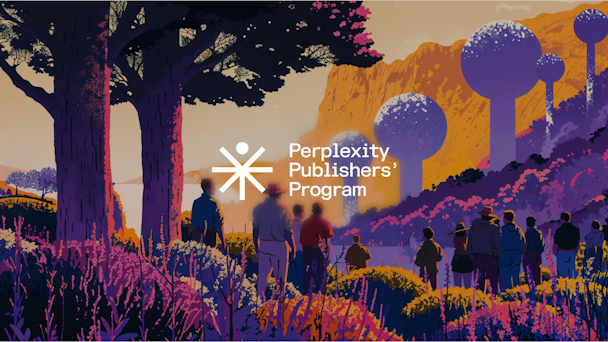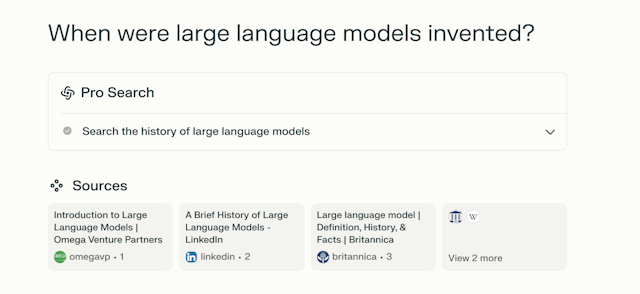Why Perplexity has agreed to share revenues with Time, Fortune & other publishers
The effort, which aims to provide publishers with AI tools and a new source of revenue, follows allegations of privacy and copyright infringement against Perplexity.

Perplexity's CBO says that the company wants "to share the revenue [with publishers] from the outset." / Adobe Stock
Perplexity, an AI-powered online search engine that generates responses using large language models (LLMs), has introduced a new collaborative program with digital publishers.
Through the initiative, dubbed the Publishers’ Program, Perplexity will place certain elements of its search engine directly into the hands of publishers: partners will be able to launch their own custom search engines on their websites via Perplexity’s API and will also be granted free access to the company’s Enterprise Pro product for one year.
Early partners of the program include Time, Der Spiegel, Fortune, Entrepreneur, The Texas Tribune and WordPress.com.
Perplexity will also introduce a new feature that allows publishing partners to earn a fixed percentage of revenue anytime they're cited in a follow-up question (a list of which is generated for every search query on the platform). Payments will be made on a per-impression basis, meaning a user doesn’t have to actually click on a question citing a publisher in order for that publisher to be compensated, Perplexity spokesperson Sara Platnick tells The Drum.
“Revenue is also done on a per-source basis, so if two web pages from a publisher happen to be cited for one response, each of those individually would earn revenue,” Platnick says, adding that the company is “also exploring other advertising mediums such as videos that play alongside a generated response.”
Perplexity wrote in a blog post today that the new revenue-earning feature will be rolled out “in the coming months.”
Explore frequently asked questions
The Publishers’ Program is being framed as an effort to equip publishers with the resources they’ll need in order to adapt to the era of generative AI-powered search, which has sparked significant anxiety across the industry.
“We structured this program to ensure we have a scalable and sustainable way to align incentives for all parties,” Perplexity CEO Aravind Srivinas has stated. “We have always believed that we can build a system where the whole internet wins, and this is just the first step.“
The initiative will, of course, also bolster Perplexity’s business. Like many chatbots and search products, the platform relies heavily upon online publishers, whose content is often ‘crawled’ in order to train underlying AI models.
It’s a well-timed olive branch extended by Perplexity to publishers – two of which have called foul against the company in recent months.
On June 11, Forbes’s chief content officer Randall Lane published an article accusing Perplexity of plagiarism after it published a story on a new product feature called Perplexity Pages “that was extremely similar to Forbes’s proprietary article,” according to Lane. The article was then turned into a podcast and a YouTube video, which reportedly “[outrank] all Forbes content on this topic within Google search.”
Forbes later threatened legal action against Perplexity, according to a report from Axios.
In a post on X, Srinivas responded to the Forbes accusations by claiming that Pages still “has rough edges.“
Thanks for flagging this. The screenshot you shared is of a new product feature we released two weeks ago called "Perplexity Pages". It has rough edges, and we are improving it with more feedback. The core Perplexity product has, from day one, had appropriate source attribution… pic.twitter.com/8GGLFUQGWy
— Aravind Srinivas (@AravSrinivas) June 7, 2024
Since the controversy, the source attribution model used in Pages has been modified, Perplexity chief business officer Dmitry Shevelenko tells The Drum.
Advertisement
Then, on June 19, a story from Wired claimed – among other things – that the search engine’s bot was unlawfully crawling multiple websites owned by its parent company, Condé Nast.
Shevelenko also believes that much of the negative press Perplexity has received has been the product of an intentional misuse of the platform. “If you’re intentionally trying to get an LLM to say something silly or do something that goes against its intended purpose, you can do that,” he says. “If somebody wants to generate bad results with ChatGPT, Claude, Gemini or Perplexity … you can generate enough of that to write a hit piece every day.”
OpenAI, the parent of the uber-popular chatbot ChatGPT, responded to a recent copyright infringement lawsuit filed by The New York Times in a similar way, basically saying that its system had been manipulated to generate incriminating results.
Shevelenko insists that Perplexity is firmly on the side of publishers, which he says are crucial to the platform’s survival. “If there isn’t a vibrant journalism ecosystem, the production of new facts will dwindle, and our ability to generate great answers will also deteriorate. There’s no world in which Perplexity is successful but there isn’t a thriving web publishing ecosystem – [they’re] symbiotic.”
He also says that plans for the Publishers’ Program were well underway before the Forbes report was published.
Advertisement
Last week, OpenAI launched an LLM-powered search tool called SearchGPT. Like Perplexity’s Publishers’ Program, OpenAI hopes to curry publishers’ favor through the launch of its new tool.
Perplexity has been widely regarded as a challenger to Google, the dominant force in online search. But Srivinas sees things a bit differently, positioning Perplexity’s functionality as an entirely novel approach to search.
“We do not have to beat [Google], neither do we have to take it on,” he recently told the podcaster Lex Fridman. “In fact, I feel the primary difference of Perplexity from other startups that have explicitly laid out that they’re taking on Google is that we never even tried to play Google at its own game. If you’re just trying to take on Google by building another … search engine, that’s not enough … because it has basically nailed this game for, like, 20 years. The disruption comes from rethinking the whole [user interface] itself.”
Google has long leveraged AI and machine learning to index its search results and direct users to relevant links. Perplexity, on the other hand, uses a variety of LLMs to respond to queries in natural language and to suggest follow-up questions. The company also pegs its credibility in large measure to the fact that it provides attribution to sources in its search results (a claim that Forbes would probably contest). In its Enterprise Pro product, sources are listed along with page titles and icons near the top of the page and information throughout results is cited accordingly.

Suggested newsletters for you
Perplexity is also leaning into its new Publishers’ Program as an opportunity to further differentiate its business model from Google’s, which generates massive revenues from ads it serves on publishers’ sites. One recent study conducted by researchers from Columbia University found that Google should be paying news outlets around $10bn a year for the value it derives from them.
Ultimately, Shevelenko says Perplexity is taking a unique approach by rewarding publishers as valued partners. “We’re not looking for a repeat of Google’s model where [we] reap all the value. We want to share the revenue [with publishers] from the outset.”
For more on the latest happenings in AI, web3 and other cutting-edge technologies, sign up for The Emerging Tech Briefing newsletter.
